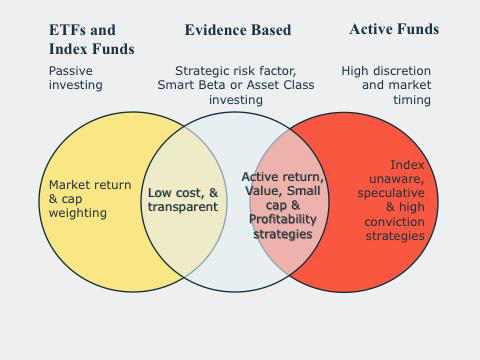Our Investment Philosophy
EVIDENCE BASED APPROACH TO INVESTING USING FINANCIAL SCIENCE
EVIDENCE AND EXPERIENCE
We have adopted a reliable evidence based (academically proven), lower cost approach to investing. Studies such as Fama[1] & French (2010 Journal of Finance)[2] in which 3,156 US equity mutual funds were studied from 1984 to 2006 have shown that there is no evidence that trying to outguess market prices adds value. Fama’s research has shown that stock picking is too inconsistent and unpredictable to be a reasonable method of beating the share market. Over time we have become increasingly disappointed by fund managers trying to consistently deliver returns above market returns net of their fees.
PHILOSOPHY
There are two main camps of investing: “Passive” and “Active”.
“Passive” is where you agnostically pick the market via an Index fund. For example, a passive fund that covered the NZ share market would include all listed NZ shares in the percentages that represented their market value. Basically, in a passive fund you are buying the market. The market return is referred to as getting a “Beta return”. Buying the market is a low cost approach.
“Active” is where fund managers use their expertise and research to select companies that are considered to be likely to outperform the average return of the share market. They might do this by analysing company accounts, company site visits etc. This is a high cost approach. Getting a return greater than a Beta return is referred to as adding value or adding “Alpha”. This used to make sense but now with the Internet a lot of this propriety information is readily available and reflected in the price of the security.
In 2012 Fama & French confirmed Fama’s earlier work on his ‘efficient market hypothesis’ which states that asset prices fully reflect all available information. A direct implication is that it is impossible to “beat the market” consistently on a risk-adjusted basis since market prices should only react to new information which is reflected in the price.
“Active management is a zero sum game, and that’s before costs. That’s not opinion. That’s maths.”
Eugene Fama, Nobel Laureate 2013
“SMART BETA” APPROACH
This approach has the advantages of investing “passively”; primarily diversification and low costs, as well as some of the advantages of “active” investing; namely that the index chosen can be filtered against “factors” or “dimensions”. The dimensions chosen may be factors such as the market (shares vs bonds), company size (small caps vs large cap), relative price (value vs growth), profitability (high vs low) and capital re-investment (the Fama-French 5-factor model). Effectively, Smart Beta is a rules based approach and bridges the gap between the low cost passive approach and the high cost active approach by applying dimensions.

INVESTMENT STRATEGY ADOPTED:
After much due diligence Lyfords adopted a “Smart Beta approach”[3] to constructing investment portfolios. Studies have shown that active fund managers are not consistently delivering fund out-performance. Their overall fees make for a worst outcome than passive funds.
The key benefits for our clients are:
- Greater diversification across markets (over 43 countries and more than 8,600 companies) resulting in lower volatility.
- Lower cost, average portfolio manager expenses of 0.42% vs 1.22% p.a. for a balanced portfolio constructed from active managed funds. Some fund managers may also charge performance and buy/sell fees.
- Peer-reviewed academic evidence based investing.
- The portfolios utilise less trading, lower costs of trading avoiding high fund manager fees.
- An independent custodial platform is used which provides third party compliance and tax efficiencies, security, online access to performance, market summaries and tax reports.
YOUTUBE VIDEOS:
For an independent perspective, check out the videos in the section "Why Indexing Investing is Taking Off".
![]()
[1] Eugene Fama, University of Chicago economist, Economic Sciences Nobel Prize winner 2013
[2] Fama-French 1993 “three factor model” of investing and subsequently the Fama-French 2015 “5-Factor model
[3] Smart Beta Passive Approach has been adopted and refined by organisations such as Dimensional Fund Advisors. Dimensional was founded in 1981 by David Booth and Rex Sinquefield former students of Fama). The Nobel laureates; Eugene Fama, Robert Merton and Kenneth French (of the Fama-French three factor model) are academic consultants to Dimensional Fund Advisors and the Nobel laureate Myron Scholes is one of the independent directors
